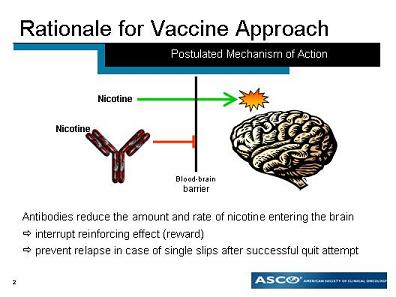Attitudes and Beliefs Regarding Nicotine Vaccines
Study Personnel
Principal Investigator: Jamie L. Studts, Ph.D.
Co-Principal Investigators: A. Scott LaJoie, Ph.D., Lee Ridner Ph.D.
Project Coordinator: TBA
Graduate Students: N/A
Study Synopsis:
Tobacco use is the most preventable cause of illness in Kentucky and has been linked with health conditions ranging from cardiovascular disease to cancer. Despite the known risks, rates of tobacco use remain above 25% in Kentucky and 20% nationwide.
 Several tobacco cessation approaches have shown efficacy in helping motivated tobacco users quit smoking, including nicotine replacement, pharmacotherapy, and behavioral approaches. Yet less than 1/3 of participants in even the most rigorous tobacco cessation programs achieve long-term abstinence, and there remains ample room for improvement in developing effective tobacco cessation interventions.
Several tobacco cessation approaches have shown efficacy in helping motivated tobacco users quit smoking, including nicotine replacement, pharmacotherapy, and behavioral approaches. Yet less than 1/3 of participants in even the most rigorous tobacco cessation programs achieve long-term abstinence, and there remains ample room for improvement in developing effective tobacco cessation interventions.
Recent research has led to the development of nicotine vaccines designed for use in tobacco cessation and prevention by reducing or eliminating the reward value of nicotine. Investigators have reported tremendous success with nicotine vaccines in animal models, and preliminary reports of phase I/II clinical trial data have been encouraging. While nicotine vaccines present a novel approach to tobacco cessation, researchers and clinicians have also suggested that nicotine vaccines could be administered to children and adolescents to prevent the development of nicotine dependence. However, there are many significant clinical, psychosocial, and ethical factors that warrant consideration regarding the utility of these vaccines.
The purpose of this proposal is to explore attitudes and beliefs regarding nicotine vaccines as treatment and prophylaxis for nicotine dependence:
- The first specific aim is to explore attitudes and beliefs of current tobacco users regarding the use of nicotine vaccines as treatment for nicotine dependence.
- The second specific aim is to explore parental attitudes and beliefs regarding the use of nicotine vaccines with children as prophylactic agents against the development of nicotine dependence.
This proposed project includes focus groups to identify the important parameters relevant to the potential uptake of nicotine for treatment and preventive purposes. Based on focus group data, the project will develop and administer survey questionnaires and apply conjoint analysis procedures to identify the crucial factors that influence decision-making regarding vaccine utilization. This data will be used to educate clinicians regarding the crucial factors in counseling patients regarding this novel approach to tobacco control and insure informed treatment decision-making.
Publications:
1.
2.
 Facebook
Facebook Twitter
Twitter Linkedin
Linkedin